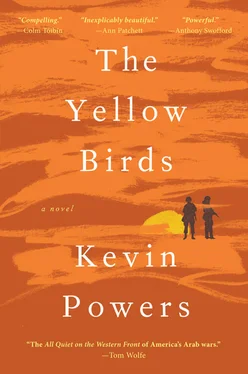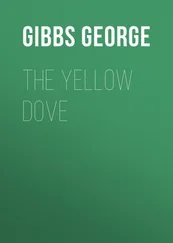I pictured myself there. Not as I could be in a few months swimming along the banks beneath the low-slung trunks and branches of walnut and black alder trees, but as I had been. It seemed as if I watched myself patrol through the fields along the river in the yellow light, like I had transposed the happenings of that world onto the contours of this one. I looked for where I might find cover in the field. A slight depression between a narrow dirt track and the water’s edge became a rut where a truck must have spun its wheels for a good long while after a rain and I saw that it would grant good cover and concealment from two directions until a base of fire could be laid down which would allow us to fall back.
“You all right, hon?” my mother said. No one was in the field. Certainly I was not. Her voice gave me a start, and I fell back into myself as we reached the other side of the bridge.
“Yeah, Ma, I’m fine.”
I let the green blur of trees along highways and side roads lull me into some approximation of comfort until we turned down our gravel driveway. The yard had not been mowed in a long time.
“What’s the first thing you want to do, sweetie?” she asked excitedly.
“I’d like to shower and then…I don’t know, sleep, I guess.”
It was almost noon and it was spring and the pond behind the house was quiet. She helped me bring my duffel inside the house, and I went into my room. “I’m putting breakfast on, John, your favorite.” Bright sunlight fell between the wood-slatted blinds. I shut them and pulled the curtains over. I shut the light off and pulled the chain dangling from the ceiling fan. The hum of the blades muffled the cars’ engines on the street and the soft rattle of pans in the kitchen. I smelled the grease and the unmowed grass. I smelled the clean house and the wood-frame bed. It was all filler. The noise, the sound, they existed just to take up space. My muscles flexed into the emptiness I still called home.
The room was dark and cool. I was tired. I folded my cover and put it on the bedside table. The blouse came off next. Then the belt, hung over the bedpost. I sat on the bed and reached down, unlacing the right boot first, then removing the right sock. In the muddy dimness, the dog tag strung into the laces of my left boot shone. I fingered it and sat upright.
I was disappearing. It was as if I stripped myself away in that darkened bedroom on a spring afternoon, and when I was finished there would be a pile of clothes neatly folded and I would be another number for the cable news shows. I could almost hear it. “Another casualty today,” they’d say, “vanished into thin air after arriving home.” Fine. I leaned down and finished unlacing the boot and strung the dog tag back around my neck and let it lie against the other. Left boot and left sock off. Pants off. Underwear off. I was gone. I opened the closet door and stood in front of the dressing mirror. My hands and face were tanned to rust. The rest of my body, pale and thinned, hung in the reflection as if of its own accord. I sighed and crawled beneath the cool sheets.
My mind and body waxed and waned under the fan. The sound of motors trilled as they moved toward our house, then lulled off into the distance as they rolled past. A train in the cut beyond the wood line made its shift as well, high-pitched and seeming to hurtle toward my single bed, as if falling toward me, as if I’d become some mass attracting the noise of metal and the metal itself. My pulse fluttered up into my eyes. I exhaled hard whenever the noise rolled past, off toward some other target. I don’t remember what I dreamed, but Murph was there, Murph and me and the same ghosts every night. I don’t remember what I dreamed, but finally I slept.
Al Tafar, Nineveh Province, Iraq
When we neared the orchard a flock of birds lit from its outer rows. They hadn’t been there long. The branches shook with their absent weight and the birds circled above in the ruddy mackerel sky, where they made an artless semaphore. I was afraid. I smelled copper and cheap wine. The sun was up, but a half-moon hung low on the opposite horizon, cutting through the morning sky like a figure from a child’s pull-tab book.
We were lined along the ditch up to our ankles in a soupy muck. It all seemed in that moment to be the conclusion of a poorly designed experiment in inevitability. Everything was in its proper place, waiting for a pause in time, for the source of all momentum to be stilled, so that what remained would be nothing more than detritus to be tallied up. The world was paper-thin as far as I could tell. And the world was the orchard, and the orchard was what came next. But none of that was true. I was only afraid of dying.
The orchard was quiet. The lieutenant waved his arm from side to side until he had the attention of the sergeants and corporals. When he saw that he did, he made one long sweeping motion in the direction of the orchard and scrambled up out of the ditch. We followed. The only sound was the padding of forty or so boots in the dust, neither running nor walking, and our breathing, which grew louder when we ducked to meet the first low branches and the softness of the orchard floor.
I kept going. I kept going because Murph kept going and Sterling and the LT kept going and the other squads would keep going and I was terrified that I would be the one who did not. So I ducked down under the low-hanging branches and followed the platoon inside.
When the mortars fell, the leaves and fruit and birds were frayed like ends of rope. They lay on the ground in scattered piles, torn feathers and leaves and the rinds of broken fruit intermingling. The sunlight fell absently through the spaces in the treetops, here and there glistening as if on water from smudges of bird blood and citrus.
The squads moved out in an arc, hunched over like old men. We stepped carefully, looking for trip wires or any sign that the enemy was there. No one saw where the fire came from. For a moment it seemed to come from far away through the trees, and I caught myself staring in amazement at the shadows cast by the sunlight falling through the branches. When the first round snapped by my head, I was still thinking that the only shadows I had seen in the war had been made of angles: hard blurs of light falling on masses of buildings, antennas, and the shapes of weapons in tangles of alleys. The bullet came so quickly that the time it took to push that thought out of my head was imperceptible, so that before I even noticed, the other boys were firing back. I began to fire, too, and the noise of the rounds exploding in the chamber pushed in my eardrums and they began to ring and the deafness expanded as if someone had struck a tuning fork at perfect pitch, so that it resonated and wrapped everyone in the orchard in his very own vow of silence.
We didn’t see where the fire came from when it came. We saw only the leaves as they flicked about and the small chunks of wood and pieces of earth that danced around us. When the ringing of the first shots subsided, we heard bullets, sounds like small rips in the air, reports of rifles from somewhere we couldn’t see. I was struck by a kind of lethargy, in awe of the decisiveness of every single attenuated moment, observed in minute detail each slender moving branch and the narrow bands of sunlight coming through the leaves. Someone pulled me down to the orchard floor, and coming out of it I dragged myself on my elbows behind a withered clump of trees.
Soon there were voices calling out, “Three o’clock, fucking three o’clock!” and though I had not seen anyone to shoot at, I squeezed the trigger, dazzled by the flashes from my muzzle. What looked like an obscene photography began, followed by the shimmer of spent casings as they bounced against the bark.
Читать дальше












